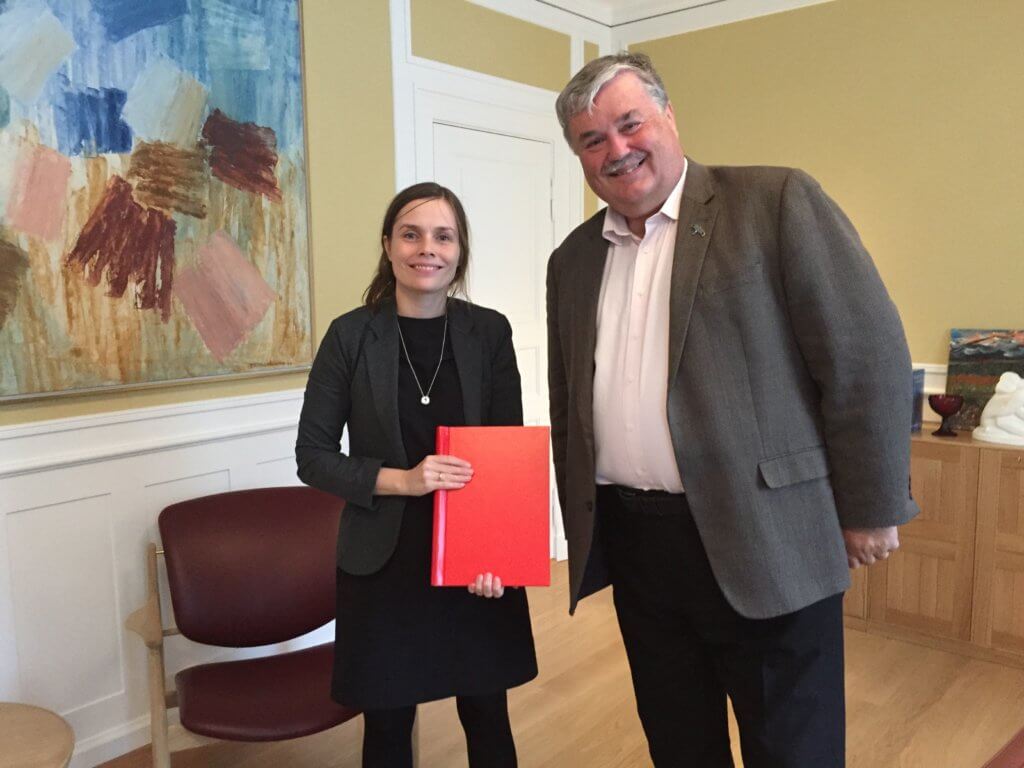
Iceland has had a general election and the results of it may have implications for whaling, climate change action and the composition of the EU.
Iceland is a small country geographically with a very small population – its land area is just under half of that of the UK but its population is less than 1% the size of that of the UK. Imagine that England had a population that is only the size of that of Coventry and you’ve got the picture. Well, there are also lots of mountains and glaciers and not many trees, to fill in some of the picture.
I visited Iceland three years ago to hand in a petition from the Bird Fair (remember the Bird Fair) asking the Icelandic government not to allow whaling to continue. And Iceland being a small friendly country, I got to hand that petition to Katrin Jacobsdottir, the Prime Minister, and chat to her for 15 minutes. Ms Jacobsdottir is from the Icelandic Green Party, a left-leaning political party, and she has headed a coalition government for several years running up to this election, whose results are awaited today.
Iceland is moving slowly towards ending commercial whaling without actually saying that that is what is happening. Almost every Icelander you meet will tell you how fiercely independent the country is and how it doesn’t react well to being told what to do by others. Fair enough, I used to reply saying that that was OK but of course UK residents could be fiercely independent in not coming to Iceland as a result of their fiercely independent dislike of whaling, rightly or wrongly, and that seemed to go down quite well as a fair point. There is no doubt that external pressure, of the right kind, can influence what countries do but it is difficult to be sure of the right type of pressure without knowing a country very well.
Of relevance to this is this petition calling for a boycott of the Faeroes because of their continued killing of dolphins – click here.
The result of a general election will be likely to affect the pace of change on whaling as well as everything else depending on the make-up of the new government and who will lead it. That’s how political change works.
Climate change has been an issue in this election in Iceland. Iceland is in a pretty good position on this issue with abundant thermal energy which makes heating costs very affordable for its residents. Coupled with very good building standards to ensure that winter remains outside it’s a country that is well-placed to cut emissions much quicker than other nations which is why the suggestion of getting to carbon-neutrality by 2040 is a real prospect for Iceland’s 400,000 population. In addition, a warmer climate, thanks to everyone else’s emissions, might do some good for the Icelandic economy, particularly agricuture.
The prospect of Iceland having a go at joining the EU is on the table so maybe the UK’s 65 million Brexiteers will be replaced by Iceland’s 400,000 Joiners.
As of this morning, the main gains so far in the election of 63 MPs to the Althing have been the Progressive (not very progressive really) Party which has gained 5 seats and the main loser is the Centre Party which has lost 6 seats.
Now the results are in (Sunday afternoon):
- the Icelandic electorate has elected more women than men to the Althing for the first time (as befits arguably the most gender-equal country on Earth)
- the Left-green Party was reduced in size by 3 seats
- the leader of the Independence Party, the largest party in parliament, has said he doesn’t necessarily expect to be Prime Minister
think how much space there would be for nature if England only had a population the size of Coventry! #One%Goal
Iceland is a country without a navy, that beat the UK in a naval war. Three times.
“Great stuff” Mark on all your efforts to persuade Iceland to stop the absolutely ghastly killing of marine mammals especially whales and dolphins. Let’s hope indeed that this election result leads to Iceland finally halting these horrendous practices of a medieval age.